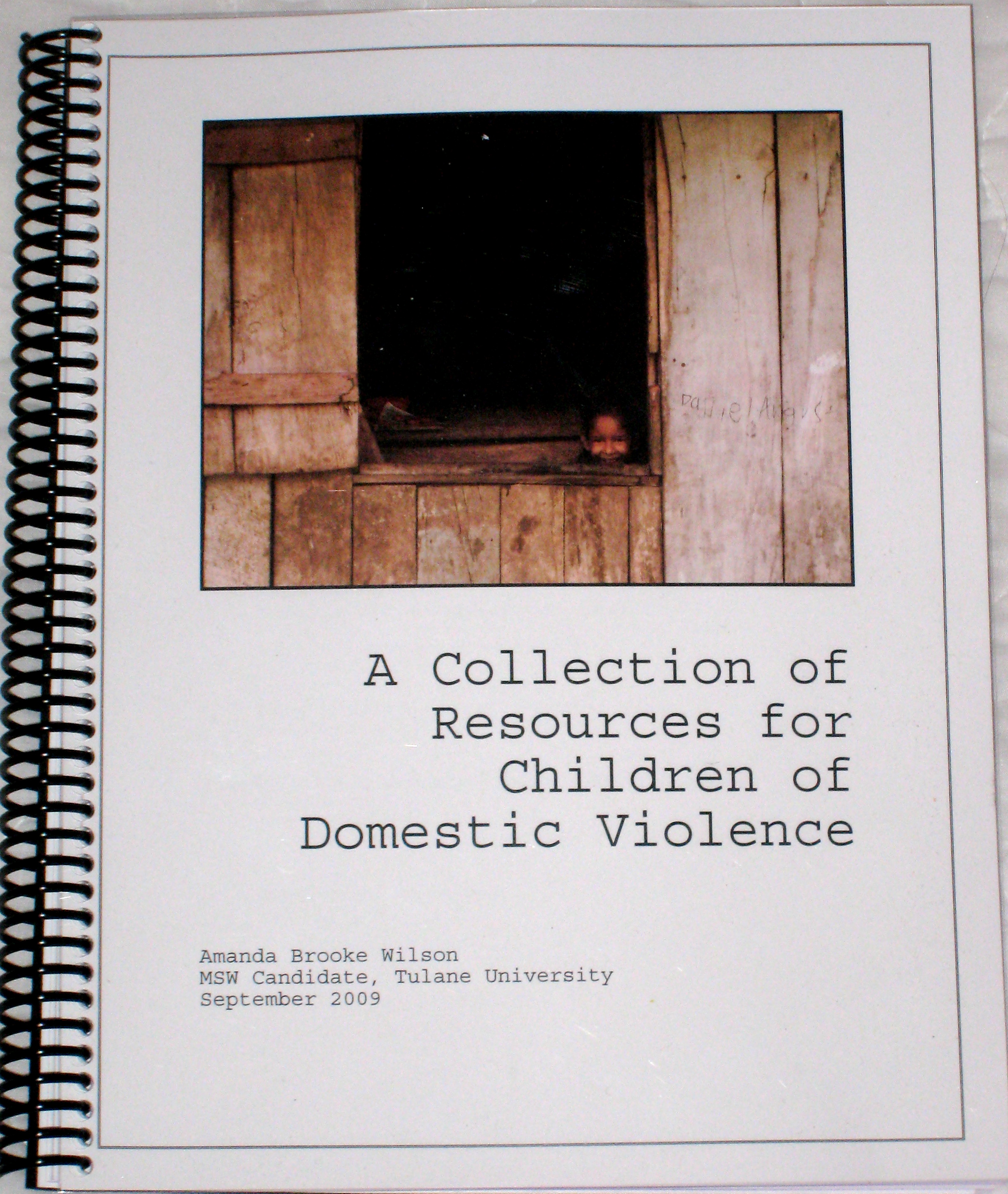Monday, September 28, 2009
Guardians of Garbage
I was on my first Indian train going from a city to a small hiking town up in the mountains. The trains, like many public spaces, are organized hierarchically to define passengers by their membership in the social strata. I was in the 1st Class non/AC sleeper car. The presence or absence of air conditioning in one's life positions a person on the continuum of success and worthiness. A person is constantly being scrutinized by society based on a combination of their choices and ancestry.
"Are you Veg(etarian) or Non-Veg?" -- It is a question, laced with judgment, as to whether or not a person is Hindu or Buddhist and what is that person's level of dedication and spiritual depth.
"What religion are you?" -- The question doesn't refer to what your spiritual philosophies are, rather what your family's history is and how you should be treated accordingly.
"What languages do you speak?" -- If you converse in English, you are educated. You are a functioning member of the academic and professional class. If you speak Hindi, you are a populist. You are working class. All of these attributes are concrete declarations about a person's societal worth. They are articles in the constitution of one's being that define both a person's understanding of themselves and a person's space and trajectory in the caste-class based country.
On this train, I was sitting by myself for most of the ride. However, for the last hour or so, a well-dressed woman and her daughter sat directly across from me. They spoke excellent English. We chatted light-heartedly while I munched on a snack from the train's food vendor. When I finished my snack, I crumpled up the cardboard container and stuffed it into my backpack to throw away later. Upon doing this, the little girl started laughing and looked from me to her mother for validation. Her mother gave a brief laugh and then instructively stated "just throw it out the window of the train."
referring to my garbage.
"No, that's okay. I can just throw it out in a trash bin when I get to my stop," I said.
"No, No. Just throw it out the window. Nobody holds onto their trash." She said with a little less patience.
"Really, it's okay. It's not a big deal at all. I'll just throw it out when I get to my stop in a couple minutes."
"Just throw it out the window." She says as a final declaration. And then, without waiting for a response, she reaches into my backpack, grabs my trash and heaves it out the window of the moving train.
I would laugh about this later with my mom on the phone. We would discuss how funny it is to be in place where the customs are so different.
She says that she can't imagine just throwing a big wad of trash out the window of her car. We go on to talk about "the jerks" who recklessly throw trash out their car windows in her small town.
I've been here for over a month now and although I will never be able to understand India like a native, I am at least starting to get a glimpse into the "why" of people's behaviors. Today, we had a lecture about the lower castes --t he "dalits," or the untouchables. The lecturer talked about dalits as being the garbage collectors of society, the toilet scrubbers, the oppressed. They are oppressed by a fundamental belief of impurity, of inferiority. The belief runs so deep that it is as close to genetic as a belief can be. It is fashioned into the caste system as a token of heritage. The belief is that there is a section of society that is so irredeemably lowly that they are never to be seen or heard. They are lucky to be given the privilege of cleaning toilets for 50 cents a day.
This belief pervades all behavior and conduct in society. The belief is vindicated through constant questions about a person's definition -- caste, religion, language, etc. The belief seeps into the unconscious day to day happenings. The upper castes know that for every peice of trash that they throw on the ground, there is a dalit to pick it up. I think back to the well-dressed woman who threw my trash out the window. Was she enforcing that belief? Was my resistance to littering a passive attack at her position in society? Was she threatened by the thought that a person could be responsible for their own garbage? Was my holding onto my garbage a statement of dangerous equality? I could be, and probably am, far from understanding the social values that would cause a person to defend their right to litter a beautiful countryside railroad track. Nevertheless, I was impacted by the event. Now, I can't help but ask myself if I too function with the belief that someone will always be there to clean up the garbage from my privileged life.
--- Timothy van der Veken
Saturday, September 26, 2009
The Goat on the Roof
OK so here is where I was earlier today (Saturday) at 5 p.m. I am sitting in the library of my agency (pretty much a small room) researching about advocacy and LGBT rights, etc. The desk I am using is right in front of the window that overlooks the Santacruz district of Mumbai. It's a tall building so the majority of what I see are roofs and alleyways and the pedestrians down on the streets. I stop reading and just look out onto this huge view filled with roofs, hung colorful laundry, antennas, etc. And I see this woman step out onto the large roof of this one building, a very posh looking building. She is walking around the entrance way near the glass doors and she is looking at her white sari in the reflection. I start to watch her and then I realize that part of the white floor that covers this roof is moving. I realize that it isn't the flooring, it's a white goat that blended in with the flooring on this roof.
For a second I almost just disregarded this goat on the building, but I could feel the old Chris from one month ago being like: "HOLD UP!!! That goat is on a roof!! This is weird Chris....remember when things could still be weird to you??" And I thought more about this goat that is chained up on this building that is probably 12 stories tall. And I just wonder so many things....how did he get up there?? Who decided the best place for this goat would be the roof? Why did this woman not even look in the direction of this goat? Did he take the elevator??
I ask the librarian why he thinks this goat is on this roof and he looks at it and just says "yes...a goat" "No, I know Rakesh...but why on the roof" "Better air?? He no like pollution....my eyes hurt down there too, better for goat" "I don't think he chose that though, Rakesh" "You can't be sure Mr. Krishna" You're right Rakesh...I can't be.
I let Rakesh get back to work and I realize that this is the perfect representation of Mumbai...of maybe even all of India. It's strange, it's confusing, and if you asked why it is...you will probably just get even more confused.
Just let the goat be there. Just go with it. The goat isn't hurting anyone...no one said roofs and goats can't be friends. Just let it all go Chris....just let it be there. Stop fighting the explanations. The goats there...deal with it. And so I am now thinking in my head every time I don't understand something, it's just the goat on the roof. Just let it be. Make peace with that goat. -- Chris
Friday, September 25, 2009
Brooke vs. Flu (vs. color wheel)
I got the flu. (Not the stomach flu — the coughing, fever, swine-ish flu.) I went to the doctor and discovered there is also a bacterial infection in my stomach. Perhaps a visit from my old friends Samantha and Jon? I spent a week in bed eating toast and rice and Dayquil and Nyquil and Cipro. Caye Caulker is closed, schools in Cayo and Belize City are closed and half the schools in PG are closed, because of flu. I had to go to town on Tuesday to see the doctor, and buy some meds and phone credit, ran into my supervisor for 10 minutes, and by Thursday, she had the flu. Everyone has flu. Everything is closed.
In the meantime, rainy season came! It started raining the day after Independence Day and hasn’t stopped. We welcomed the change for a few days, and then got stir crazy, and now can’t do laundry because nothing ever dries. I am still enjoying the cooler temps though…
Laundry is still the exact same.
On Monday, providing the flu has passed and schools are reopened and supervisor is healed, I’ll have my first four clients. On Tuesday and Wednesday, hopefully the next eight. The majority are kids who have been through Mary Open Doors and are now in area schools trying to adjust. We’ll see them on an individual basis during the school day — once a week for the next eight weeks, Children’s Bureau style. No one had really considered seeing the child during the school day, during art or some other enrichment hour, instead of at the end of the day. As noted from years of programming at the Boys & Girls Club, after school is a frustrating time to get kids to sit down and do some more work, even if you throw in a game and a pencil case. My supervisor got permission from the school system and principals, and we’re all excited to see how this goes. She’s anxious to learn from the ideas and resources I’ve brought, and I’m excited to learn from her expertise with families. A volunteer from Mary Open Doors will accompany us to co-facilitate the sessions and learn how to work through the manual for use within the shelter. She'll take over facilitating halfway through, and my supervisor will continue with the school kids after I leave.
In the village schools my only task is to do a lesson with the Standard 4, 5 & 6 classes on how to write an autobiography. This is so they can enter CFI's writing contest this fall and be awarded when the CFI comes this spring. No biggie. I thought it would be easy, and I reserved Thursdays exclusively for this purpose. But, as you might have guessed knowing Antonia and Belize in general, nothing of the sort has happened. The first Thursday Antonia whisked me off to take pictures of each class and of each building to send to the Ministry of Education for a report. No problem. I insisted on coming back Friday to at least award last year's winners to generate some momentum toward the project. Somehow I ended up in Standard 3 doing a color wheel with Richard. Not only that, actual color wheels were never even created. They were pages of smeared red or blue paint. In some cases a long brown streak with a splash of yellow. I think the kids missed the point. Antonia came in, looked at me and Richard, who were covered in red paint, looked at the kids who had obviously not learned how to mix colors properly, and laughed about how she sent two perfectly capable people into teach the kids six colors, and we couldn't pull it off. The following Thursday I showed up, and they sent me to build a float for the parade. The following Thursday - flu. Everyone. No autobiography. I did, however, manage to award last year's winners and take pictures to document:
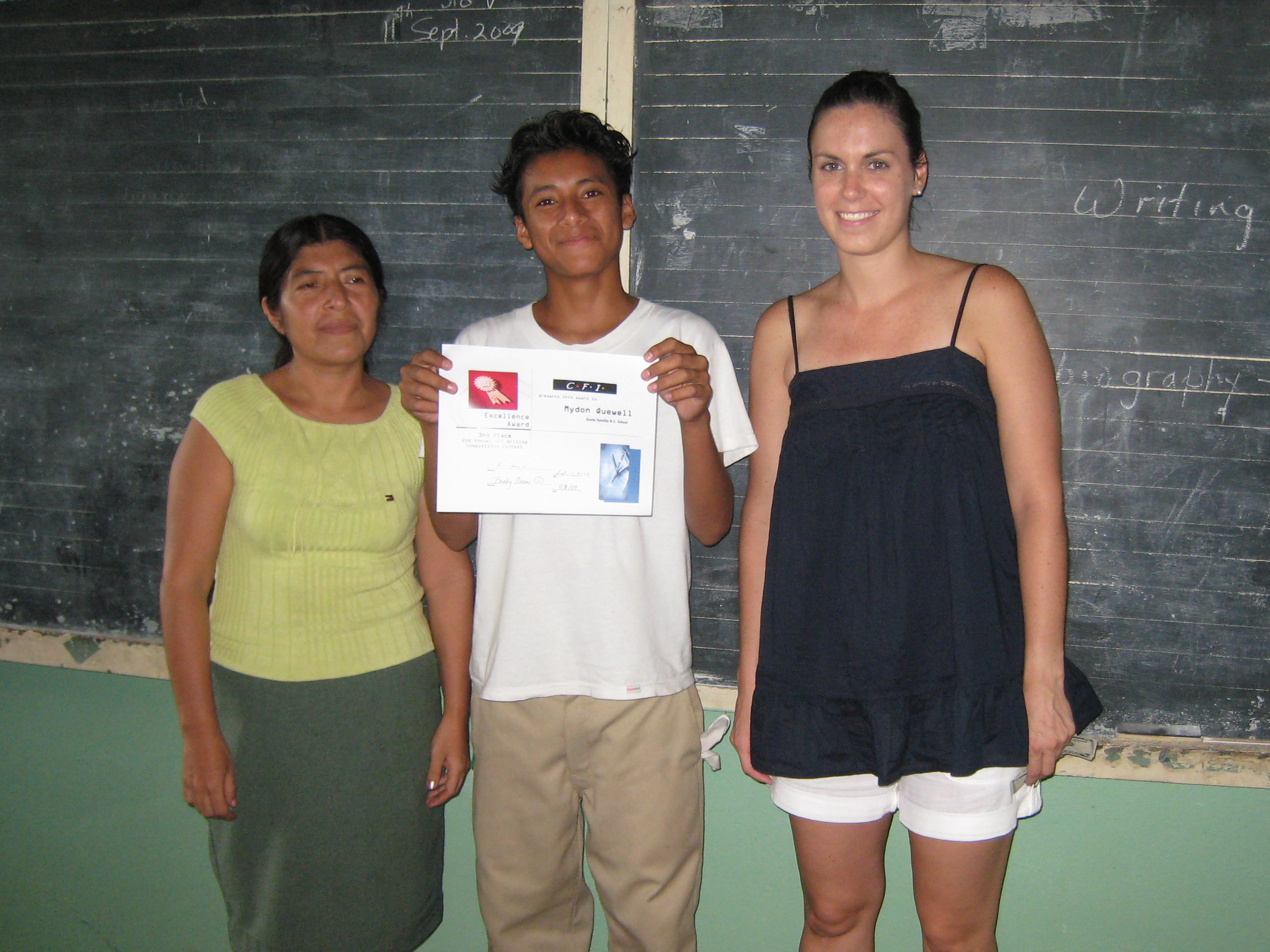
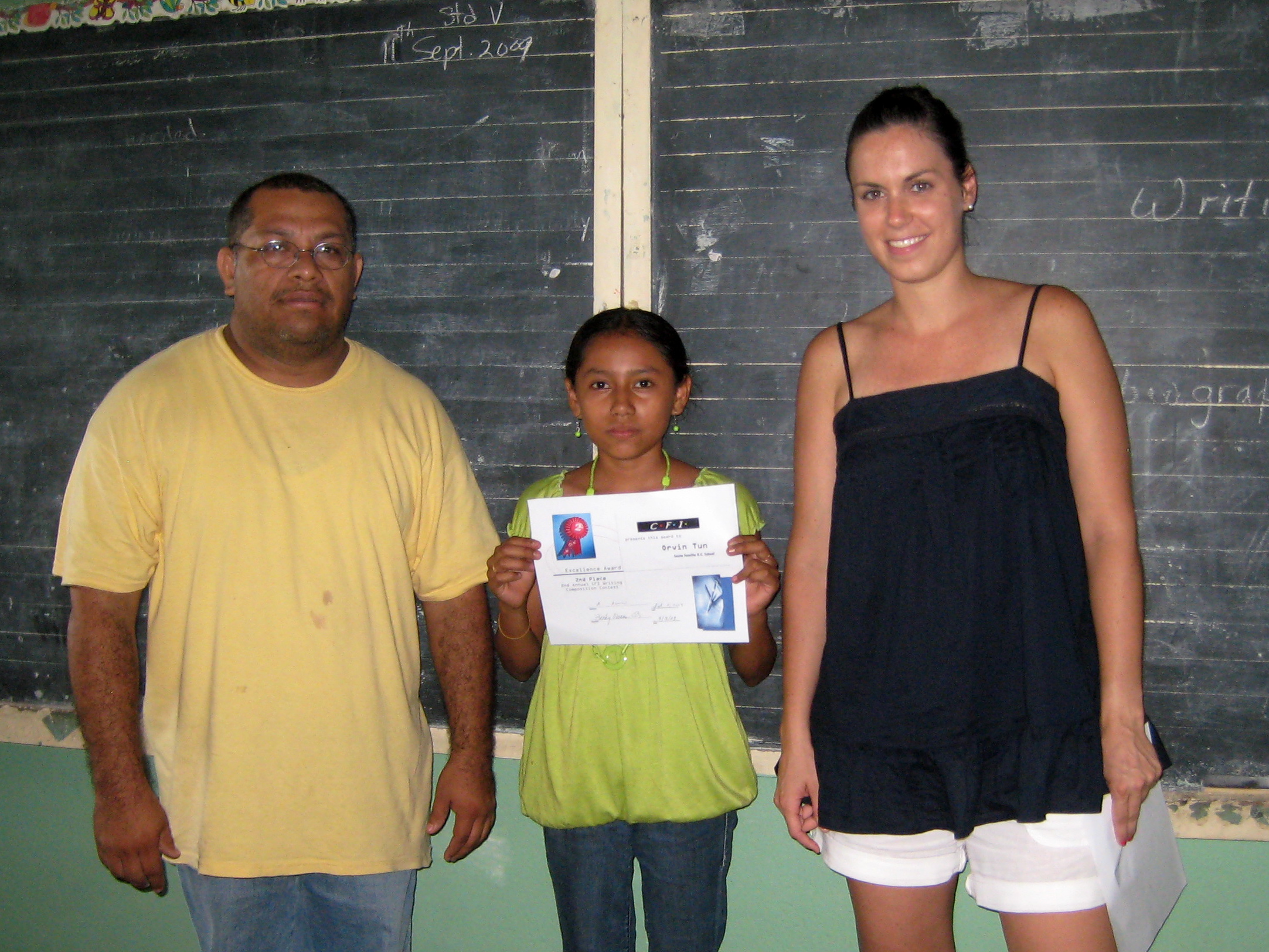
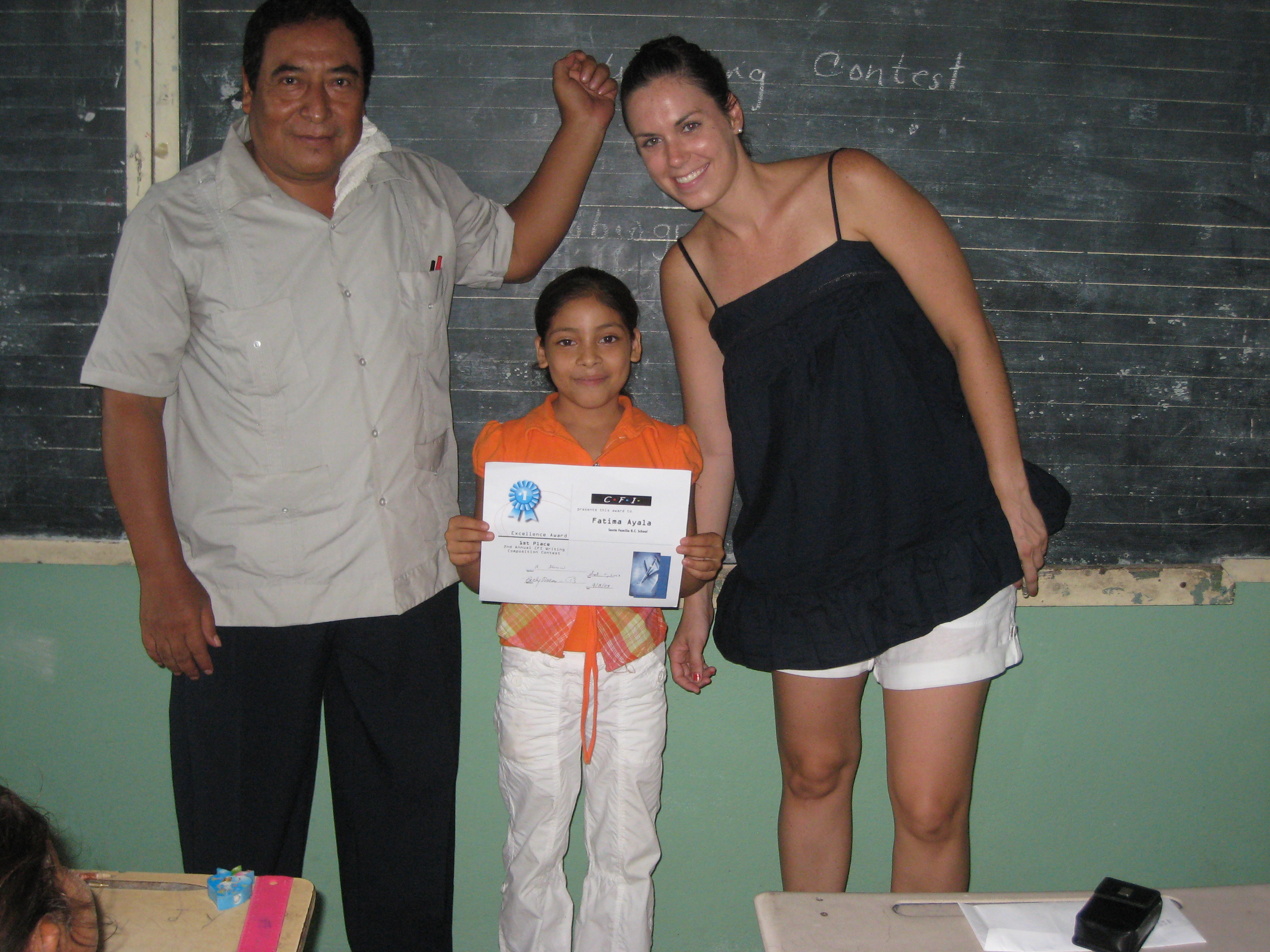
Next Thursday: Autobiography, come hell or high water or color wheels or parades or flu.
Thursday, September 17, 2009
Getting into field
I'm not sure exactly everything I will be doing yet, but many days will consist of traveling with the employees to a nearby slum where education programs occur with the younger children in the morning and the older children in the afternoon. (The older children go to school in the morning and the younger children go to school in the afternoon). A key goal of the organization is family preservation and helping the community be able to make ends meet. While most of my days will be spent in Colaba, yesterday I went with the director and the other student (from Sweeden) to visit a village.
We traveled by rickshaw, train, and then rickshaw again to get to the village which is approximately two hours north of Mumbai. The village is on the water so my organization is consulting with the community leaders to educate the people on the importance of keeping the water clean and helping them to plan a clean-up day for Saturday. While the whole meeting was in Marathi (the official language of Maharastra, the state where Mumbai is) it was still very interesting to watch the process of the meeting and see how similar the meeting functioned to community meetings that I've attended in New Orleans.
On Saturday I may be going back to the village to help with the clean-up and see the different educational skits, but since everything is starting at 7 a.m. if i go I get to stay Friday night with one of the women from my placement who lives in a neighboring village! I say if I go because I'm feeling a little under the weather, but hopefully I will be good to go for this experience.
 Women of the village with the fishing boats in the background
Women of the village with the fishing boats in the background
Fish hanging out to dry.
Some additional observation and facts you might like to know:
-Sari's come in a least three different lengths: 6, 9, and 12 feet of fabric. I will be learning how to wear one before I leave and it will probably just be the 6 foot one.
-Parts of Mumbai are so developed that one can "forget" about the slums for a period of time (compare the foreground to the background of the picture)

-monkeys are everywhere on Tata's campus most mornings.

Wednesday, September 16, 2009
Fresh
You know me. I love hot weather. I love Belize. I’ve done this before, many times, and weathered fairly well. But for some reason this time I just can’t cool off. Every day they say, “Today is hot Brooke.” And I say, “Yes, and yesterday was hot.” And they say, “But today is extra hot, Brooke. It’s not usually this hot.” And I just nod, thinking every day feels the exact same hot to me, and I just have this God-given need to strip everything off and sit in front of the fan naked. But then there’s the problem of electricity. We’ve had blackouts in the evenings. Which means in addition to no water, there is also no fan. Which is why I haven’t been sleeping, which is why my immunity is down, and I guess, why I can’t keep any food in me. Or maybe it was the street tacos and papaya juice? I don’t know. I am on a solid diet of soup and oats until further notice.
As for my job, every day I learn a little more about patience, waiting and flexibility. Monday was really profitable: meetings were held, trainings were scheduled, plans came together, clients assigned, letters written, learning goals established, the right people answered the phones at the right times, and the day was full of shade and fans and productivity and calls from boyfriends and moms, and tomolitos for dinner. There was lots of smiling and motivation and hope and excitement. Tuesday, however, I stared at a wall. Then walked from empty building to empty building up and down that giant hill. It’s like everyone in the city got together and agreed to disappear. At the end of the day, six hours later, the only tangible thing I could recount having been accomplished was a uniform found for a girl who needed to start school Friday. I suppose for that little girl, Tuesday was a good day. For me, no. By the time I realized nothing was happening and no one would be in the office, I had missed the 1 o’clock bus. The next bus was at 4 o’clock. So I sat and walked and sat and walked for three hours and then caught the bus home — which, you should know, always adds four layers of dust to sweaty skin, which, you already know, may or may not be washed off when those eight drops of water come at 7:30 p.m. You get the idea. They tell me every day, “Life in Belize is hard, Brooke”. Usually I reply with something like, “Yeah, but you have great social capital or Yeah, but the weather is nice, or Yeah but your limes are delicious.” Last night I nodded and said, “Yes. Life in Belize is hard.” Inside I was thinking: that stupid lime tree that gives such delicious limes pricked me and we can’t get the thorn out.
Sigh. Sorry. I guess I’m kind of complainy today. How about some pictures?
(As if on cue. No pictures on my flash drive. They’ll have to be on the next post.)
Monday is Independence Day in Belize. They’ve asked me to judge the parade on Friday…
So like...what do you actually DO in Rwanda?
I am interning with CARE International here in Kigali. CARE’s tagline is “Defending Dignity, Fighting Poverty”, which I believe makes me some kind of super hero. The office here is involved in a variety of different projects…water and sanitation, gender-based violence, early childhood development, HIV/AIDS, orphans, environmental issues, etc. I’m working in the Orphaned and Vulnerable Children department, specifically with the COSMO project which essentially gives community support and mentoring to orphans living in child-headed households. (Brief background information: a government-funded study in 2007 found that according to the meticulously drafted criteria for “vulnerable children” a full 83% of Rwanda’s youth were defined as “vulnerable”. I met a group the other day that was recently commissioned to find different data with modified criteria. I'm not sure if it's because the government is embarrassed by the state of affairs or if the criteria really were too broad. Maybe both.) CARE is looking to transition itself out of this project in the Musanze district of Rwanda (near the Congo border…gorilla territory, and sometimes guerilla territory), so I have been commissioned to do a comprehensive "service mapping" of the area.
Basically, they want to know ALL of the organizations that provide services to the current beneficiaries of the program, what they specifically offer, and how to obtain those services. The idea is to come up with a final tool that could be of use to local mentors so that the children will be able to continue to be aided after CARE pulls out. Also, it will only help the service providers if they themselves have a better understanding of who does what for whom. Rwanda, in addition to being the Land of 1000 Hills, is also the Land of 1000 NGOs. Unfortunately, I get the impression that many of these programs are not all that well coordinated with each other, creating a lot of duplication. (Perhaps a blog entry for later.) This exercise should expose some of that. It will also help in the "impact evaluation" of the project. For instance, if we find that certain services simply are not offered, that would explain a lack of access.
It may seem fairly easy to collect this information, but remember that I do NOT speak Kinyarwanda, nor do phones work all the time, nor do people always keep appointments or return forms or e-mails (or so I've been warned). Doing business in rural Rwandan highlands is not on my list of things at which I excel. There is also a fairly involved "political" process with which to contend, so everything we do has to be routed through and approved by district officials as well. It's an interesting process.
As part of my professional project for school, I’ll be conducting interviews with child heads of household about their social interactions. Long story short, there’s a lot of research out there about physical/biological needs of orphans, and even mental health needs of orphans (particularly those who’ve suffered trauma), but there’s not much in the way of research or programming concerning peer relationships/friendships/play as a constitutive element of being…well…happy. Or at least not clinically depressed.
So that’s what I’m doing. I’m also dabbling in the Early Childhood Development (ECD) area, currently working on researching “best practices” for home based early childhood care models. CARE is building three ECD centers up in Musanze, but they’re also evaluating the sustainability of having children cared for in the home rather than investing in physical structures. I'm putting together a literature review to profile existing success stories.
And there, folks, is a very dry yet informational blog post. Thanks for reading.
Thursday, September 10, 2009
Hello from Mumbai
This is Chris, and this is my first official blog from Mumbai, India!
It is weird because I thought that this blogging thing was going to be very simple and easy and that I would blog everyday. I began to think why it took me such a long time to blog, especially because I have so much to blog about going from New Orleans to Paris and then to Mumbai. I think a lot of it has to do with the fact that there are so many things, so many highs and lows, that I don't think I could put it all in one cohesive post. But I'm breaking this post into two parts:
1.) The Highs
- Chai tea -- It's amazing and served everywhere. I waited in an office on campus and if I took up every offer for Chai tea, I would have had 12 chais in one day.
- Monkeys -- There are monkeys on the Tata Campus!! That is so cool! There's just a family of them, and they just wonder around as if they are waiting for their next class to start.
- Generosity -- Everyone I have met has gone above and beyond their call to help me with a problem. Whether it is me and the others getting lost on the trains, or trying to figure out my internship, everyone has been so nice.
- How different it is -- India is completely different from anything I have ever experienced. The way people interact, the language, the weather, everything seems completely new and different and in many senses that is completely thrilling.
2.) The Lows
- Language barrier -- In all honesty I completely thought English would be spoken much more than it actually is. I don't know why I thought that. On campus it is fine, but even right out the doors of the school, there is definitely a lack of English speakers.
- Running around in circles -- No one in India is in charge of anything it seems. It seems like the person you always really need to talk to is behind some door, in a very Wizard of OZ way. I attempted to speak with my supervisor on many occasions and yesterday was by far the worst. While I usually bother the secretary about making an appointment, the secretary was absent and the woman made me schedule an appointment. It wasn't until I left the office that I realized I scheduled an appointment with the secretary. Not the supervisor. I essentially made an appointment to schedule an appointment. That's terrific.
- How different it is -- This is of course also a low. There are just many small things that make me long for washers and dryers, and bland foods, and quiet strolls down a street. Because Mumbai is a monster. A crazy, animated, insane monster of crowded streets with cows, goats, sheep, vendors, rickshaws, cabs, buses. Anything you can think of and it is probably on a street in Mumbai. Without a doubt.
-Chris F.
Wednesday, September 9, 2009
Brooke? You look like a begger.
B. I forgot to tell you this last time. I have been over the bus routine several times with the family I am staying with and others in the village. I know what time the buses come. I know where to stand. I know where to get off. I am all set. So Monday I felt fairly confident in my bus-catching skills. I woke up an hour early and took my time cooking oats, packing my lunch, picking out my first day outfit, loading my bag for the day, etc. and had everything ready to go by 8 o’clock for the last bus into town. I stood by the door looking far into the distance for that bus. I had seen the 7 o’clock bus pass and the 7:30 bus and both 7:45 buses. Mine would be next. Richard walked out sleepy-eyed and said: "Brooke. What are you doing? It is only 7 o’clock." I looked at my watch and realized I was looking at the CST setting. I was an hour early.
(The funny thing is that when the 8 o’clock bus actually came, I was talking to Antonia and almost missed it. She saw it pass behind me a couple of minutes early, ran outside and yelled Boyeee! I had to run after it.)
Also, when I take the 4 or 5 o’clock bus home, many of the high school students take the same bus, so I wasn’t surprised to hear “Brooooooky!” from down the street while I sat on a stoop by the bus lot. Shawn, who likes to think he is an extra-cool version of 16, shook his head and laughed at me from way up the hill. He sat down next to me, which was nice because I had spent all day waiting for people that never came. I was tired, hot and out of water. He said, “Do you want to go on the bus, Brooke? You look like a begger.”
And here’s the worst part. When I got on the bus, Bryon said: "Brooke! A strange thing happen last night. I neva see wah tornado in all of Belize, but last night a tornado came, right here da Cayo!" I froze, and vaguely remembered a sleep-talking-walking incident from the night before wherein, during a huge storm, I shook Inez awake and tried to make her get under the bed because in my sleep a tornado was coming. She laughed all morning and told everyone at school. When I got off the bus, they yelled out the window: Brooke, be careful because an earthquake will come tonight at 6 o’clock, and hail will fall from the sky!
We’ve been laughing about that for three days.
I met my supervisor this week, and she was grrrreat. She works for the Ministry of Education and is the only social worker in all of Cayo! She seemed worn out just talking about all the need in the district for only her to attend to. I am looking forward to learning from her and traveling to different schools and homes. One boy, she said, was 14 and selectively mute. She said no one knew how to make him talk, so people hit him over the head and yelled in his face. They wanted to put him in the special needs program. But she went to his home a few times to play simple games with him like tic-tac-toe, and then progressed to snakes and ladders with the family, and the boy was talking within weeks. She is still assessing what caused him to stop speaking in the first place, but her work seems interesting and never-ending, and she has been very welcoming.
As for the shelter, I spent four hours yesterday talking with three ladies who’d been through the shelter and are now volunteers. Their stories are hard to hear. It seems to me that the most severe cases of domestic violence in the States are the middle of the bell curve here -- hot dinner on at 5, windows closed and locked, no speaking unless spoken to, shut the kids up, etc… -- the more I hear, the more depressed I feel about gender roles. Even among well-respected, high-functioning families, the roles are different. Three times today I heard mothers telling their daughter, “No one is allowed to hit you. You have a right…” because the norm is that they don’t have a right — so much so they have to be taught NOT to tolerate abuse.
In other news, I have not instituted jump rope hour at the Flowers like I promised. It’s just too hot. I really can’t waste clothes on things like exercise :)
Impressions
I can’t think of the right adjective to apply to the vibe of Kigali. Controlled, perhaps. Measured. It really is a lovely city, very clean, wide and well-paved roads, well manicured green spaces, people walk on the sidewalks, no dogs or goats or pigs roaming the streets (though I have seen the same chicken cross the road twice). I guess I was expecting slightly more chaos, and chaotic it is not. That said, I am beginning to understand that much of what I see in Kigali is likely the outcome of a very strong, heavy handed government.
I had read quite a bit about Rwanda and Paul Kagame’s approach to governing the country, so I had expected some degree of lawfulness. In the books and documentaries I imbibed before coming, the culture had been labeled “obedient”. The people had been called "conservative". From what I've seen thus far, I would agree with those sentiments. People do little more than glance at me or nod when I walk down the street, no calls or stares to speak of. The kids have given me a few sing-song “Muzungu!” shouts (Muzungu means “white person”, obviously), but it’s not an accusation so much as an acknowledgment. I just smile and wave, or ask “how are you?” so they can practice the English they now learn in school. The few times I've looked particularly baffled, people have approached me to offer help. Even the poor moto driver who took me on a 45-minute tour of Kigali after mistaking "Kaciryu" for "Kicukiro" was very sorry that he wasted my time when it was clearly my fault for a) not being clear, and b) not speaking the language.
In some ways, I feel the same way about being here in Kigali as I do in New Orleans. I don’t know what the “Before” is like. I am experiencing the “After”, and for that I have no frame of reference. I am the outsider looking in on a society that experienced profound devastation, and that event will forever serve as the dividing line. For instance, there are no street dogs here because almost all of them were shot by the various armies after the genocide. The dogs were eating the bodies. Maybe there were dogs everywhere “before”, but again, I don’t know the “Before”. This is just a trivial example of what I’m talking about, but the same principles apply to just about everything I see. In trying to process and understand all that I am seeing and experiencing, I find myself trying to filter it through something of which I have no comprehension — the genocide. Granted, I’ve been here little more than 48 hours, but I’m straining to use my keenest powers of observation to attempt to get acclimated as soon as possible.
This weekend I’m traveling to Kibuye with a fellow Tulane graduate who’s interning here with the Payson Center for International Development. It’s a quiet town in the west on Lake Kivu, which straddles the Congo-Rwanda border. It is also home to the most comprehensive extermination of Tutsis during the genocide. Before 1994, nearly 20% of the population was Tutsi. Ninety percent of that Tutsi population, roughly 10,000 people, was murdered in those few months. There is a church that serves as a memorial in Kibuye; 4,000 people were killed there during the peak of the war. It should be an interesting experience.
Being here, I've been thinking a lot about memory as it relates to the healing process. I've also been thinking about shaping collective memories from a public policy point of view, and how it relates to rebuilding and redevelopment. I think there a many social work implications caught up in contemplating how to "memorialize" something in order to allow people to grieve while still progressing in a positive way towards the future. Perhaps this will be the topic of future posts.
Ignorance is Bliss
The walking is not what has me in awe, because that was one of the main things I was looking forward to while in the US. What has me in awe is the number of guys walking the streets holding hands and hugging. When I say holding hands, I am talking about fingers interlocked with one another and sometimes swinging their hands together while they are locked together. Despite the westernalization (yes, I just made up a word) of many countries due to globalization, I was amazed to see guys being so close with each other specially in the capital city, Addis Abeba. In the US, some guys are even scared of sitting next to each other in the movies, without leaving a gap in between seats or even hug each other for the fear of being labeled gay. And that notion always angers me, I mean if you know who you are, why do you care what others think of you?
So I was so touched and proud to see guys being so free and loving towards each other without the fear of being labeled. I was happy to see the innocence in these grown men walking down the streets, and their untainted mind regardless of what the media feeds them.
But when I started to deconstruct what I was seeing, there wasn’t really much to it than what meets the eye. Initially I thought “wow it is beautiful how they can do this without any fear of being judged, which means they are not insecure or homophobic. Or they are so liberated.” Unfortunately, that is far from the truth. Like I said the reason why they are doing this does not require an in-depth look at the psyche, it is simply because they can. The society as a whole is actually very homophobic, so homophobic that they have chosen to deny the pure existence of homosexuals as whole and has discarded it as something of a western epidemic. This concept, has allowed men to express their affection openly in public without fear of judgment. Which in a way, this same concept might have given gay men SOME freedom in expressing their affection in public as well (because no one would assume they are gay). Hence, to some extent, ignorance is bliss.
(pictures coming soon)
Monday, September 7, 2009
All kinds of things
Essentials: On the plane next to me was a girl from the UK spending a month in Belize and then a month in Fiji doing some kind of medical internship. On the other side was a lady from Belize City who told the med student and me everything we need to know about Belize City. She had been visiting her daughter in Florida and thought it was hilarious that we came from the UK and the US to study in Belize, and her daughter left Belize to study in the States. She wrote out her address and phone number on an index card and gave one to each of us. She told us to call if we need anything, like lunch in Belize City. We’ll go out, she said. Unless it’s hot, then we’ll order in.
After spending an hour in baggage claim and immigration, and another 15 minutes with no power — 200 of us clamoring for carts and luggage and air — somehow the three of us landed right back in a row in the customs line and were able to say goodbye as our personal items were spread on a table for all to see.
Onward!
The minute I caught that first campfire and coconut smell and saw my first raccoon on a chain in the back of a truck (what?!) I knew I was home.
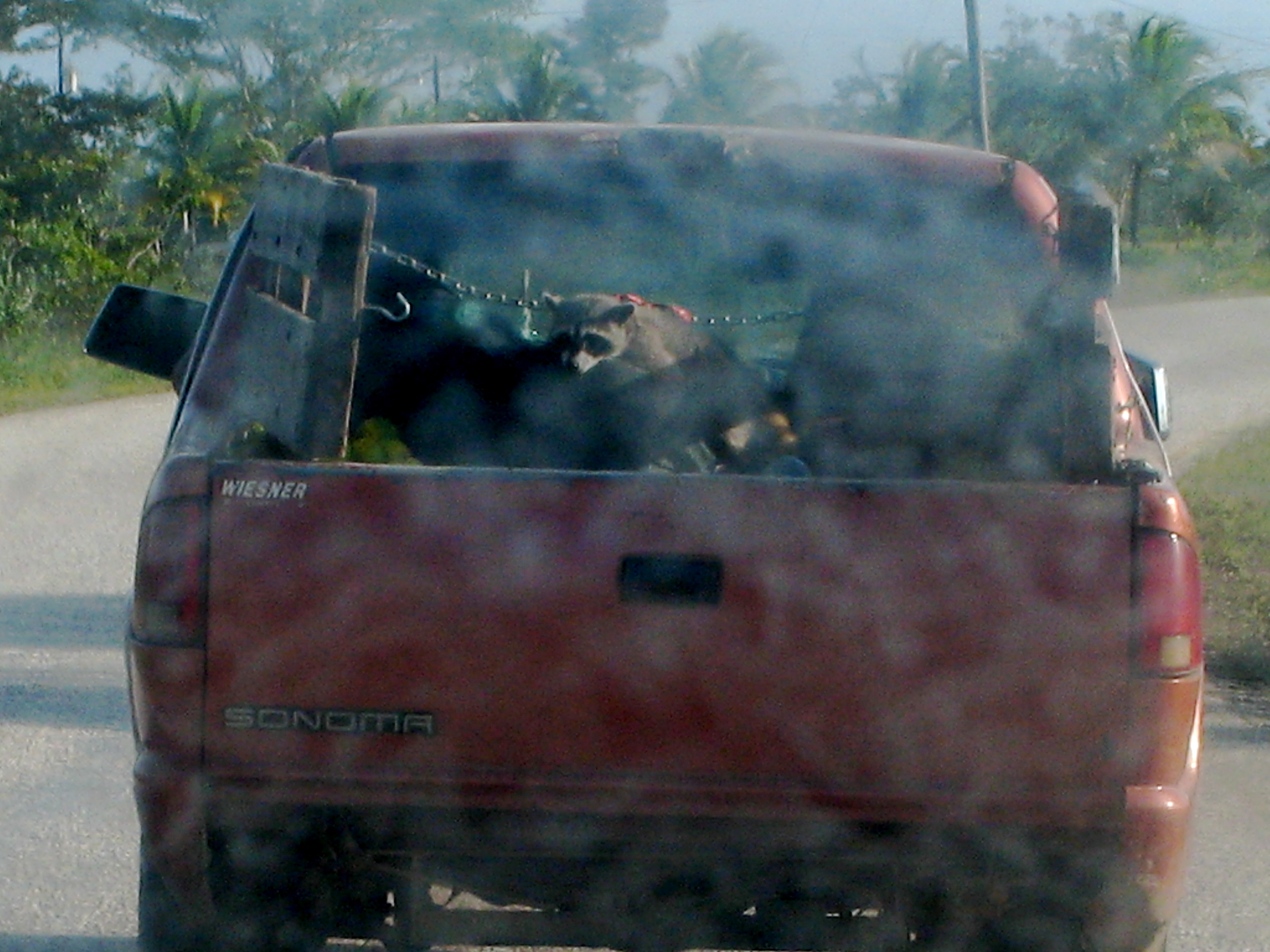
David picked me up, and when I turned to thank the baggage guy, he was climbing in the front seat. That’s Belize. Your luggage guy is your neighbor. The postal guy is your grandpa. The checkpoint guard is your cousin.
We took off down the Western Highway at sunset — my exact favorite way to drive the Western Highway — and an interesting topic came up. I learned that the city is having a meeting tomorrow about a dam that was built a few years ago. It was contested by the Belize Zoo lady, along with many different environmental groups, and pushed forward by the electric company, the Belizean government, and those who wanted Belize’s electricity to come from Belize, not Mexico. The only problem was the entire dam. Environmentalists warned that the rock wouldn’t hold, the river would suffer, the quality of the water would decline, energy prices would go up, and the flooding would kill off the Scarlet Macaw (side note: The last Flight of the Scarlet Macaw is a must-read. It’s a story about the Belize Zoo lady who fought against the dam, and the rich descriptions of the Belizean government and the people here are unbelievable. It’s full of history about Belize and Cayo District. And the author is funny. His first impression of Belize City had something to do with a pedal-by shooting.)
Anyway, I read this book before I came, got really into the dam issue and had meant to ask about it, then right there out of nowhere, David brought it up. He said they were calling a village meeting to discuss the dam. Apparently the water is orange. The orange water is downstream from the dam, right in San Ignacio. This is the water they bathe in, play in, clean with, wash clothes and do dishes in. It has something to do with the chemical makeup and silt that have filtered out and around the dam, and worse, in order to remove or fix the dam, they’d have to release the wall, which would flood all of San Ignacio and the surrounding valley villages, like Santa Familia. David said they came around this week to the villages with a blue siren and said: If you hear this sound, you have two hours to get out before the flood comes. Omg. I just knew that Zoo Lady was right!
I arrived in Santa Familila to a welcome surprise, and also termite season in my room. Antonia, Ricardo and Inez had spent the day rearranging all the rooms so Inez and I could be roomies and each have a bed in the room that doesn’t rain!

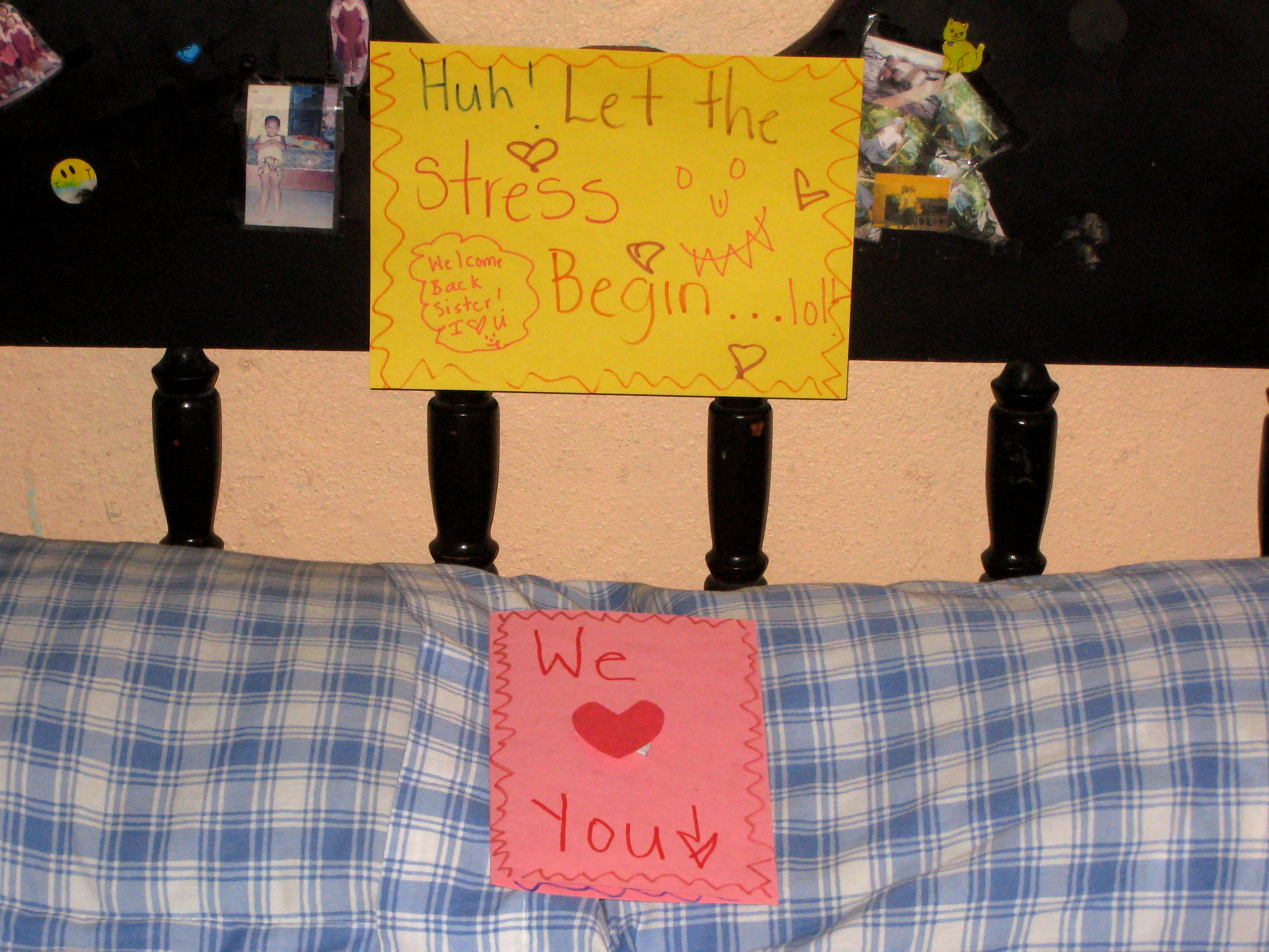

Before I could even unpack or think about how tired I was, they whisked me off to the Miss Bullet Tree pageant.
(I am trying to upload a video of a punta dancer, but it's taking forever...)
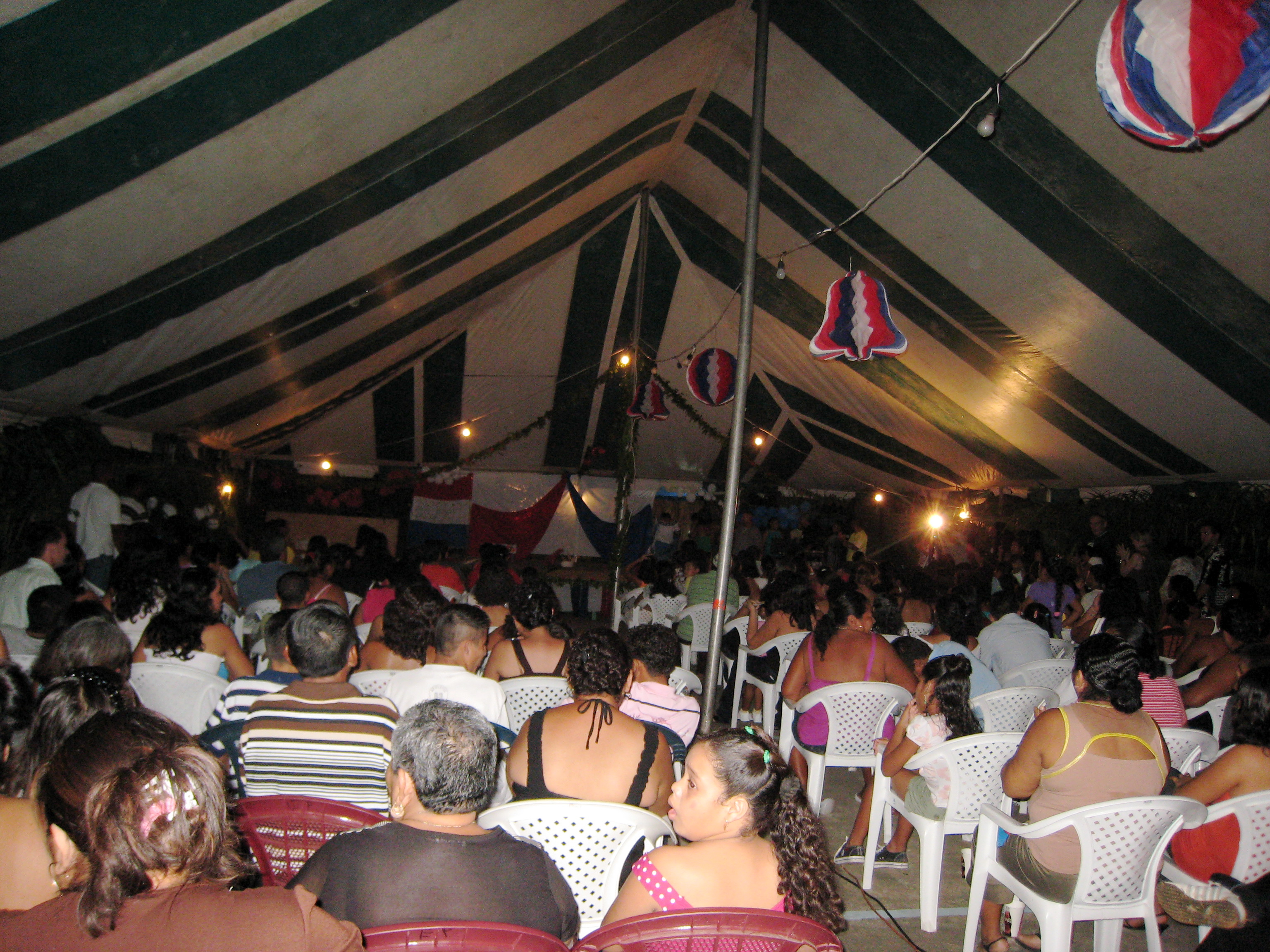
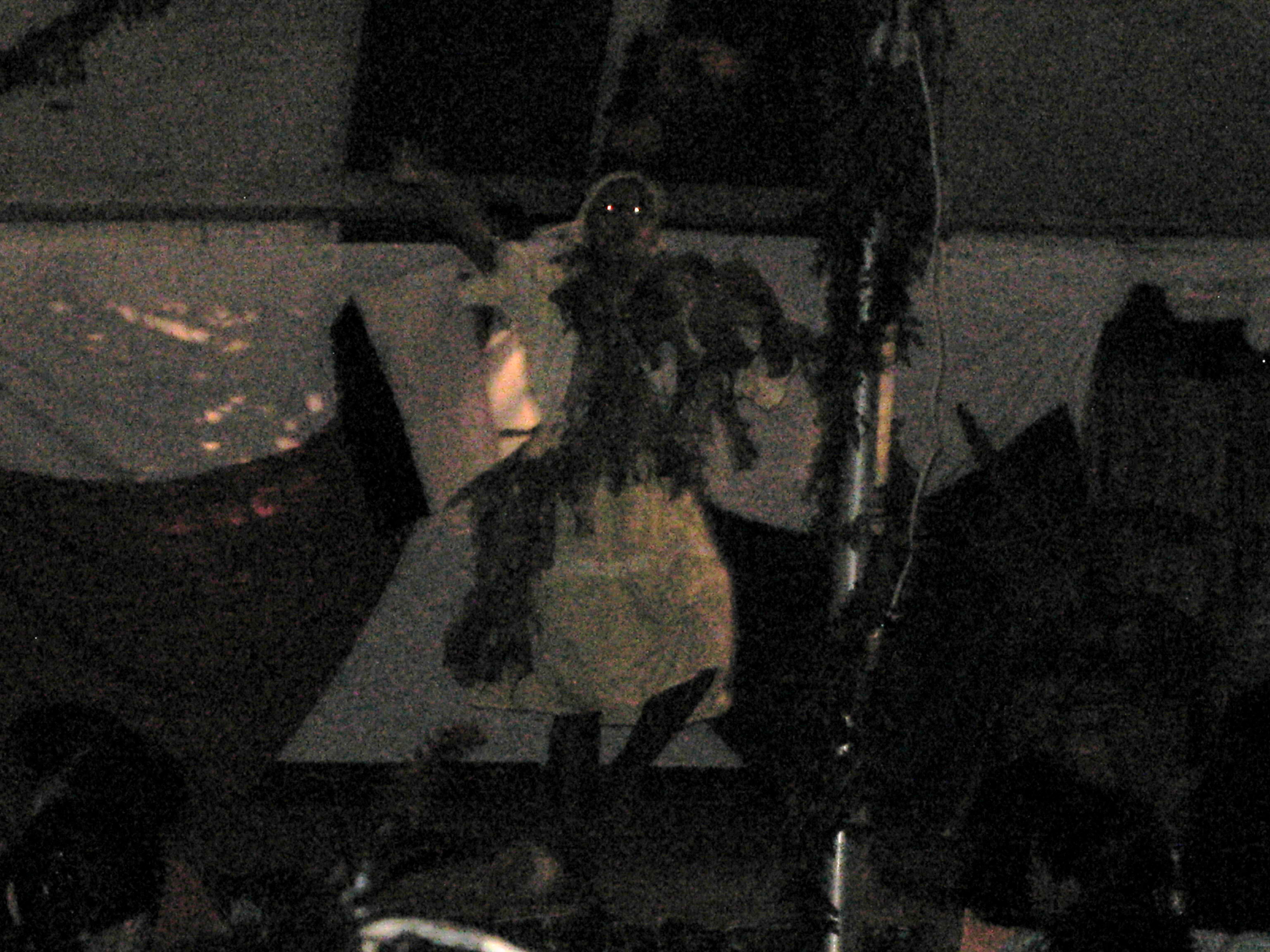
- Garifunda Dancer

- Fire Dancer
Sunday I went to church, and then to Guatemala in the back of a pickup truck, then squeezed into a cab with six people and spent an hour in the Melchor hospital. Richard (the son of the principal I am staying with) had a cough that wouldn’t lift because of the dusty roads and needed to see a doctor today for asthma. But there are no doctors in Cayo on Sundays, and so we had to cross the border. There are apparently also no doctors in Melchor on Sundays, which is how we ended up in the hospital. He got his treatment, and I bought all my little Belize gifts for you all at 1/3 price from the Gulatemalans. Finally a Guatemala stamp in my passport… although I’ve already been to Melchor. Figure that one out. Wink!
Today I am supposed to meet with my supervisor and she will accompany me to Mary Open Doors to begin the internship. But I have not been able to reach anyone. None of us have ever met each other, and the last contact I had with them was two weeks ago, by e-mail. I still took (read: chased after) the 8 o’clock bus, and if I have to hang around the French bakery eating Mennonite cookies until I figure something out, so be it.
I have a phone number, and I will soon have a phone - hopefully by the end of the day. I can receive calls for free, but your carrier will charge you for the international call. I can make calls sometimes. And I can text sometimes.
My phone number is: 011-501-621-8102.
If you see this number, answer it! It’s me.
Saturday, September 5, 2009
First trip into the heart of MUMBAI!
Today we were to have been taken on a tour of the heart of Mumbai by one of the international student professors. Unfortunately, definitive statements don't exist in India (we are learning patience very quickly). The professor cancelled on us last minute. So we took it upon ourselves to go alone. We figured that if we don't take initiative, we'll end up doing nothing while we are here. It was very smelly and the pollution and litter is enormous! I don't think anything anywhere is ever clean!
There were shops that were very clean, but the litter and the residential areas are just massively dirty. We did a lot of walking and my feet hurt a bit, but I am glad I went. At the end of the evening we decided to take a break and sit on a wall. Some kids came up to us asking for money/food. We had bought biscuits (more like cookies in USA) to hand out if kids would ask for something. We gave them cookies, and then they pretty much multiplied. I only saw like five kids when we got there, but somehow there were like 10 total. They were really fun to sit and talk with.
Not much talking happened, but they would mimic our English and then we got to a point where we could figure out how to ask them what their names were. One boy, who was about eight, knew some English. It was a really great time, until one of their moms shewed us away. She didn't want us there anymore. We had a great day in India today! I am definitely ready to hit the hay tonight!
Friday, September 4, 2009
Address and such
Instead, I'll say, calmly: Tomorrow I leave for Belize. I have packed and repacked all day. My bags weigh 49.5 pounds each and are waiting patiently by the door. There are four suitcases, one duffle, two carry-ons, one crate, & a comforter: five for Belize, two for Dallas & two for New Orleans. Everything else is neatly
Again, if I were an honest blogger, I would fill the rest of this page up with Please write! Please call! 85 times in a row I'd write that. But instead I'll say, calmly and without desperation: Here is my address in Belize-
Brooke WilsonSanta Familia VillageCayo District, BelizeCentral America
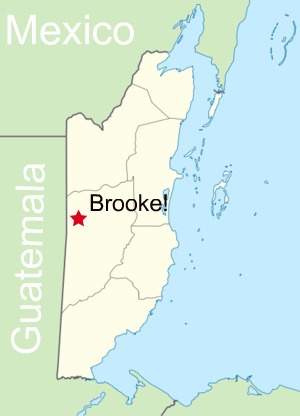
Me? I'll be working with kids in a domestic violence shelter (teaching kids and staff coping skills and anger interventions), and I'll spend one day a week in the village schools doing a writing project with the Standard 4, 5 & 6 classes. Below is my professional project, the manual I put together to train shelter staff and volunteers on interventions and coping skills for kids who have witnessed violence. I think it's pretty, and I'm excited to see how everything works out.
